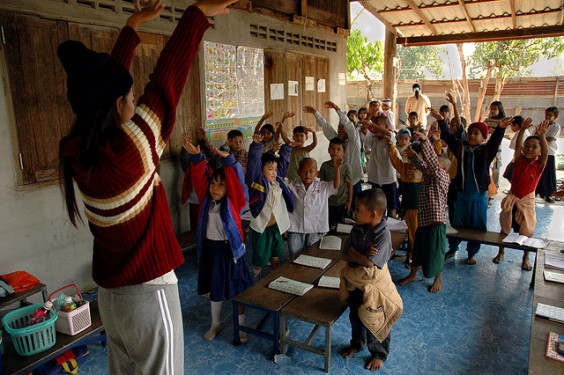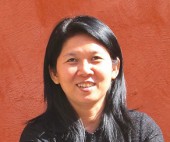Violating Freedom of Expression Has a Huge, Malignant Impact on Burma
by Ma Thida / June 26, 2015 / No comments

Censorship has resulted in a poor education system and a population with low media literacy in Burma. Photo via Flickr user: Attila Husejnow.
In Myanmar (Burma), one of our most painful conditions is the violation of freedom of expression. It leaves a huge, malignant impact on our community.
Since the 1962 Burmese coup d’état, both censorship and propaganda have worked very well to violate, either directly or indirectly, the freedom of expression. The censorship board not only prohibited and postponed the publication of some anti-government literature but also forced the publication of directly pro-government propaganda articles in both state-run and independent periodicals.

- Literature is an echoing voice of people’s thought. Myanmar literature and media have suffered a lot along with people during five decades of censorship. The majority of Myanmar’s population are voiceless, and many untold stories are yet to be discovered by local or international writers and journalists. Here let’s try to find and listen to what problems people are feeling, thinking, and facing regarding freedom of expression in everyday lives in Myanmar.

- Ma Thida is a Burmese human rights activist, writer, medical doctor, and former prisoner of consciousness. In 1993, she was sentenced to twenty years in Burma’s Insein Prison for actively supporting the Nobel laureate Aung San Suu Kyi. She served six years of her sentence, largely in solitary confinement and was released through the efforts of Amnesty International and PEN International. She has published nine books in Burmese and English, including The Sunflower (1999), The Roadmap (2011), and Sanchaung, Insein, Harvard (2012), a memoir. Ma Thida is currently president of PEN Myanmar.
In the early 1980s, it took at least one to two years to get permission from the press scrutiny board to publish a novel. Even with permission, there would be much editing. Sometimes writers decided not to publish because of immense and irrational editing by the censorship board. Most of the staff on the censorship board did not know much about literature and knew mainly the Burmese language, not other ethnic languages. There were also no particular rules or regulations applied evenly for any manuscript submitted. Staff decisions mostly depended on their individual knowledge. If they do not understand an aesthetic work, they would not give permission. Or if they did understand and thought something was critical of either the government or the army, they wouldn’t give permission then, either. That is why, since 1962, it has been difficult to have an ethnic literary tradition in Burma.
For periodicals at that time, we didn’t need to submit manuscripts before printing, Stationery services would have taken care of everything, but we needed to submit the print copy before distribution. In the early 1990s, the censorship board would ask for the removal of paragraphs or whole short stories or articles from printed periodicals before they were distributed. So we would put black or silver ink over the paragraphs, or glue facing pages together, or rip out some pages. In the late 1990s, the censorship board asked us to submit before printing any form of literature or books, including advertisement pages. Then there were no more ugly magazine pages: all forced editing was completed before printing.
Just before the censorship board abolished its process in mid-2012, a weekly current affairs journal would have to be submitted three times before it was printed and one more time before it was distributed. That is why it was impossible to have regional papers in places far from the office of the Press Scrutiny Board and where ethnic minorities live, and why media or literature in ethnic languages was almost impossible to establish. This process prohibited not only the freedom of the press but also pluralism in the press.
In addition to this, there were only state-owned newspapers and broadcasting media, run by government staff. All socialist, military, and so-called reform governments used state-owned media to distribute serious propaganda. Now, after a half-century of propaganda, citizens think all journalism is propaganda. And after 1988, exile radio stations like the RFA and DVB became source of current news for a majority of people, but it was difficult for them to give balanced reporting since spokespeople from the military government did not want to appear in news stories that would reflect badly on the government. Indeed, the media literacy of readers is limited and low.
Poor education, compounded by their prolonged exposure to censorship and propaganda, limits the capacity of media personnel in Burma. After 1988, the military regime intentionally closed all dormitories and built new colleges and university compounds at least 10 miles away from any cities. They intend to keep students apart from each other fearing that, as has happened throughout history, the students will ignite anti-government strikes and shake regimes’ power.
The irregular opening of high schools and universities in the late 1980s and early 1990s made a lot of changes to the education system too. Teachers at the high school and secondary level were asked to be dictators over their students. Their duties mainly included protecting buildings inside the school campuses, taking roll call, attending meetings by local authorities about how to handle students’ protests, and volunteering at local government activities, like building roads and opening ceremonies of new bridges. The teaching methods used at both high schools and universities never encouraged common sense or critical thinking in pursuit of knowledge, but rather the memorization of texts. As a result, the younger generation hates reading, as well as negatively impacting the country’s media literacy.
All over the world, media giants like to cover breaking news about bloodshed, rather than the positive achievements of humankind or actual stories that involve anonymous people. Because of a five decade-long media black hole, international media does not understand the context of Burma’s censorship issues. It’s unlikely that the ruling regime will provide reliable evidence or data, and local media and literature were repressed for a half-century of censorship, so the international media cannot dig too deeply into what’s happening in Burma. As a result, learning and understanding the complex issues of Burma’s politics and people is very difficult.
So while the international community looks at violent physical conflicts as either racial or religious, we, the Burmese people, face a more serious and malignant structural and cultural violence from our government. Even Buddhist education has been affected by the reduction in quality of education. Most Buddhists in Burma never learn the Buddha’s principles of nonviolence or the means by which Buddhists should forgive the sinners. And because of censorship, most people do not know about their own history, democracy or any international standards of human rights. Without knowing what their rights are, or the fact that they had been violated, they can still be happy with what they have.
The whole Burmese society is still sitting on a sizzling pot of fear. Students and supporters risk the threat of physical violence from other citizens if they want to merely express their wishes and feelings. How can fellow citizens be brutal towards one another? This is related to cultural, structural, and political violence that is rampant through Burma. Throughout our history, irresponsible governments have introduced poverty, poor education, and pessimistic views of the judiciary system as forms of violence to use uneducated, poor, and ignorant citizens as government pawns.
For those in the Ministry of Information and some citizens, “having protests” means “doing deconstructive things.” Ordinary citizens do not see the brutal crackdown on or arbitrary arrest of protesters as surprising; they believe that serving activists with long-term prison sentences is normal. They cannot even think of it as violence or an injustice. Once, according to a Burmese newspaper, Aung San Suu Kyi asked some law students visiting her in the parliament at Nay Pyi Daw about their understanding of what is law. Most of them answered that law protects the government and takes action on citizens.
Violating freedom of expression through censorship, propaganda, and an ineffective education system has resulted in locking people’s mindsets so that they are unable to understand that violence against them does not always have to be physical; what’s more, they do not think that the executive body using physical violence against its own citizens is unfair. This is the malignant impact of censorship in Burma.




